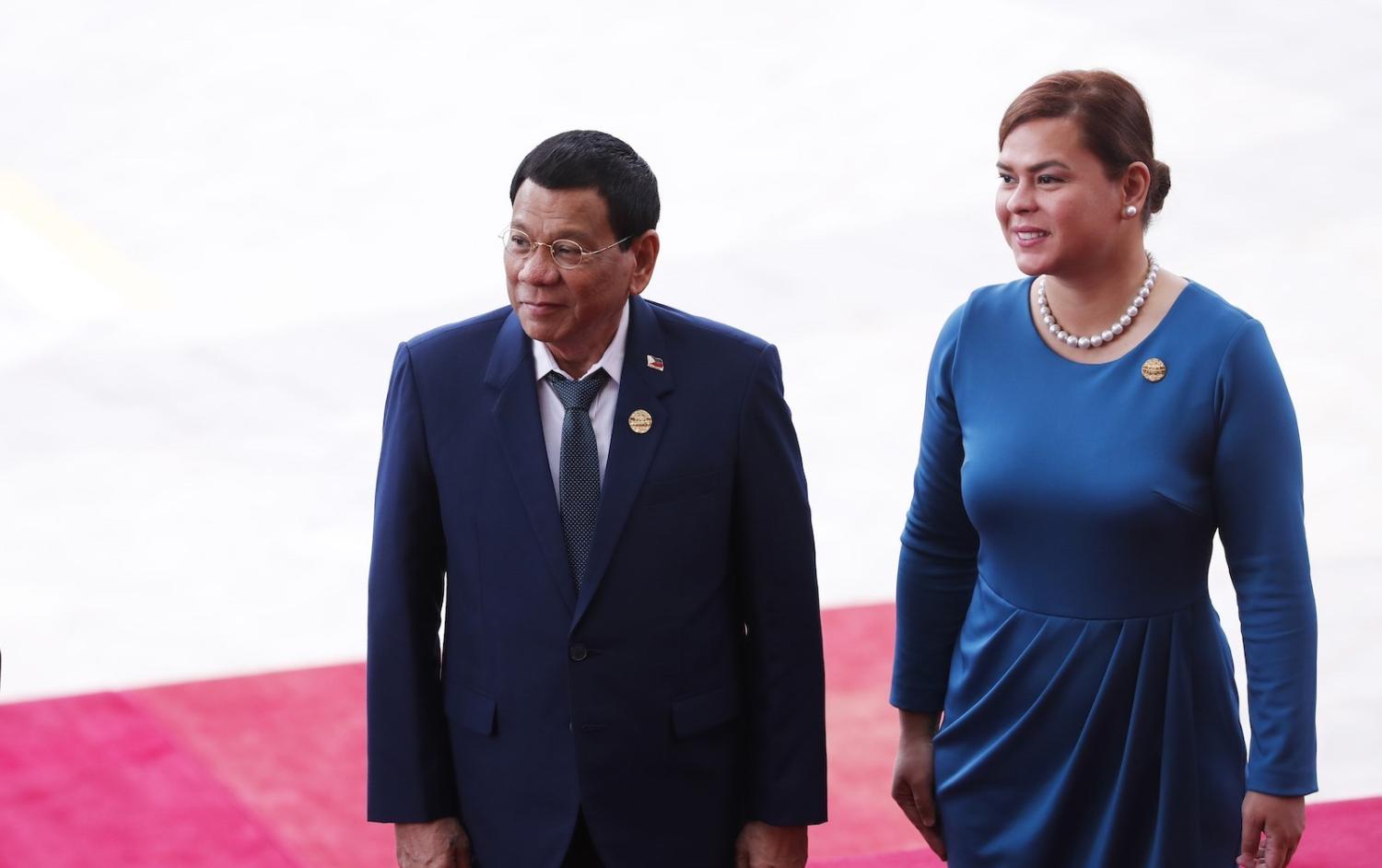Philippines President Rodrigo Duterte’s six-year term is drawing to a close in 2022, and under the current constitution, he isn’t eligible for re-election. Incumbent leaders have been known to endorse a successor leading up to the voting, but only one president* has ever been succeeded by an allied candidate.
Duterte might aim to change that. Already there is talk of Sara Duterte, the president’s daughter, taking her chances in the upcoming polls. She is currently the mayor of Davao, the family’s hometown, where her father was previously in the same job. Sara Duterte topped a recent survey of presidential hopefuls, and presidential adviser Salvador Panelo championed her cause by describing her as an “ideal replacement” for her father. Several sites online have falsely claimed that a formal bid for the presidency had already been announced.
Banners made by the previously unknown “Friends of Sara” have been popping up in major cities with the slogan “Run Sara Run!” In Metro Manila, they can be seen all over Quezon Avenue, one of the country’s busiest highways. Regardless whether the group is working independently or not, the thought of another Duterte in power has thus been planted in the public imagination.
And yet, the Dutertes have denied any such intention. The president mentioned last month that his daughter was being encouraged to announce her candidacy, although he said he’d told her not to. With characteristic misogyny, he deemed the post unsuitable for women. The Philippines, it should be noted, has had two female presidents since the election of Corazon Aquino in 1986.
The Dutertes are making it seem as though they are giving in to the clamour, instead of admitting that they concocted it.
Sara Duterte has seconded this rebuttal, albeit minus the sexism, saying that she would much rather stake her bid in 2034: “Because it’s still far away and there's a chance they could forget me in 2034”.
While public displays of humility are all well and good, President Duterte has a record of going back on his promises.
Duterte made a 180-degree turnaround relatively late in the 2016 polls – from claiming he had no interest in pursuing the seat of power to a turbocharged campaign for it. He followed this up with a series of backtracks from his pronouncements as a candidate and then as president.
Among some of the notable assertions he made was that he would do everything to protect the country’s sovereign claim against China over the West Philippine Sea. He has since conceded to the Asian superpower, even bowing to an oil exploration deal. In February of last year, the president announced plans to abrogate the Visiting Forces Agreement which catered to the military operations of the United States in the region. Four months later, he suspended the termination of the treaty, and now he is demanding the Americans increase their aid to the Philippines if they want to retain it. He jumped from taking a patriotic stance to using the agreement as leverage to bolster his regime.
In rejecting any intentions to make a sudden dash for the presidency, Sara Duterte has made an eerily similar move to her father, a political déjà vu. Why insist on it?
A motorcade of sports cars and motorcycles, urging Davao City Mayor Sara Duterte-Carpio to run for president, drives past the People Power Monument along EDSA during the 35th anniversary celebration of the EDSA Revolution.
— ABS-CBN News (@ABSCBNNews) February 25, 2021
George Calvelo, ABS-CBN News pic.twitter.com/oD52vePHAx
A big part of Duterte’s 2016 campaign was the use of social media. One study found that the Duterte camp spent around $200,000 for online promotion, using hundreds of “cyber troops” to spread misinformation and propaganda and harass users with opposing viewpoints. Online operations were found to include fellow party members, professional contractors, paid citizens and volunteer groups, as well as fake accounts that can flood social media channels with spam and amplify their metrics.
The practice has continued to this day. There are frequent spikes in such troll activity to support the regime whenever Duterte or anyone from his inner circle, including Sara Duterte, is in a political bind.
The relationship between manufactured internet devotees and any purported modesty about steering clear of the presidency creates an interesting wrinkle in the entire populist narrative: the Dutertes are making it seem as though they are giving in to the clamour, instead of admitting that they concocted it.
The popularity of the Duterte regime remains contentious at best. In December, the International Criminal Court reported it had evidence of “crimes against humanity of murder, torture and the infliction of serious physical injury and mental harm” committed during Durterte’s so-called drug war. Duterte’s focus on militaristic policies amid a pandemic to quash his political opponents has evoked fears that the Philippines is living under de facto martial law.
There is also talk of amending the constitution to lift term limits, but while the current laws are in place, Duterte looks keen for his policies to carry on as they are, quite possibly through establishing something that resembles a dynasty.
Davao has been characterised by Duterte leadership for the past decade, the same brand that the father brought to the Presidential Palace. And if the Dutertes succeed in overturning the trend of opposition candidates winning elections, the country faces a daunting prospect: more of the same.
Sara Duterte might be the ticket to her father cementing his legacy, and the idea that the people willed his leadership into existence. Seeing her become president would be her father’s testament to history, to tell generations that he was right to be so cruel and deceptive.
* This article has been updated from an earlier version stating no president had been succeeded by an allied candidate.

